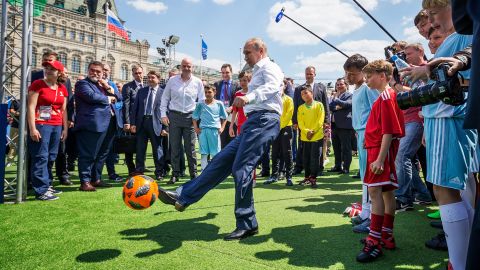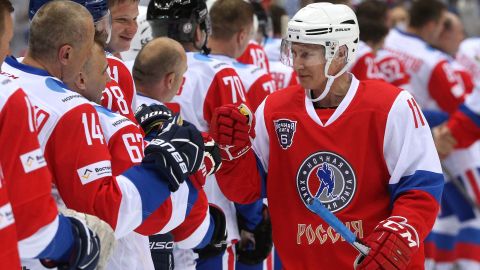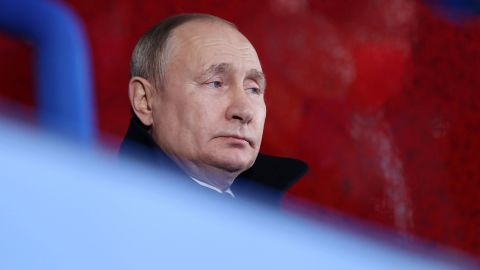CNN
—
As Russia continues its invasion of Ukraine, the grim reality of war has taken center stage, with more than two million Ukrainians fleeing the country and hundreds dead, according to the UN.
Russia is already paying a price for its aggression – countries around the world are imposing sanctions and the Russian ruble has plunged even further against the dollar, hitting record lows.
A plethora of international sports organizations and governing bodies have also responded to the invasion targeting Russia and its athletes with sanctions of varying severity, and Russian President Vladimir Putin has been stripped of multiple honorary sporting titles.
Notably Russian and Belarusian athletes were not allowed to compete at the 2022 Winter Paralympics in Beijing after multiple other countries’ athletes and teams threatened not to compete at the Games, according to the International Paralympic Committee (IPC), and the International Olympic Committee (IOC) has recommended a ban for Russian and Belarusian athletes competing in international competition.
“The situation is monstrous, of course. This is a disgrace for the International Paralympic Committee,” said Kremlin spokesperson Dmitry Peskov told reporters following the decision.
The IOC also announced that it had withdrawn the Olympic Order – the highest award of the Olympic movement – from Putin.
“The IOC was viewed as having a close relationship with Russia,” Michael Payne, former head of marketing at the IOC, told CNN.
“The fact that the IOC has now issued a set of sanctions to Russia, which, in my view, are probably the strongest sanctions the IOC has ever issued … since probably the early 60s when the IOC banned South Africa for its apartheid regime,” he said.
Meanwhile, world football’s governing body, FIFA, and European soccer body, UEFA, have suspended all Russian international and club teams from their competitions “until further notice.”

“Vladimir Putin has been passionate about both sports and using sport to project Russia’s importance on the world stage and giving back to the Russian people a sense of pride in their success on the world stage.”
Payne added that the most immediate impact of sanctions could be to challenge the Kremlin’s narrative on the conflict, with ordinary Russians wondering what has happened to events they were due to host.
UEFA announced last month that this year’s Champions League final will no longer take place in St. Petersburg’s Krestovsky Stadium, which is sponsored by Russian state-owned company Gazprom, and will now be moved to the Stade de France in Paris to be played on the original date of May 28.
“There can be no misunderstanding: no amount of control of the Russian media is able to explain what’s going on in the sports world, that they’ve suddenly been banished,” Payne said.
Russia is covering the country’s invasion of Ukraine very differently to CNN and other western news outlets. A new law forbids media operating in Russia to use the words “war,” “attack” or “invasion” to describe Putin’s decision to unleash his forces against Ukraine. Instead, they are to use the Kremlin’s Orwellian phrase: “special military operation.”
Russians’ access to social media like Facebook and Twitter has also been severely restricted.
“Sanctions may cause ordinary Russians to ask why can’t they see their Russian athletes performing? And clearly, then there’s prompting the Russian people to say ‘What’s going on?’” Payne said.
“Will Putin care about having to give his Olympic gold order back or what the rest of the international world thinks of him? Probably not.
“Will he care about what all the local Russians are saying, ‘Hang on, what is going on?’ Absolutely.”
Lukas Aubin, associate researcher at The French Institute for International and Strategic Affairs (IRIS) and a specialist in the geopolitics of Russia and sports, told CNN Sport that Putin carefully curates his image so that observers are aware of his sporting prowess, on a national and international level.
“When Putin arrived at power in 2000, one of his first decisions was to invite his former coach in judo [to the Kremlin],” he said.
The Russian premier has also been pictured ice swimming, fishing and bare-chested horseback riding.

“Today, President Putin uses sports as an element of his power. And not only as a part of his personality because he also has created a big sporting system. He’s using oligarchs, politics, former athletes, to create a machine.
“It’s a big system, where people [are] driven by Putin in the directions that they need to create a beautiful picture of Russia, in the world of sports,” he added.
This worked for the most part, Aubin said.
“It worked because in 2014, we are seeing the Sochi Olympics. Then four years after, we are seeing the World Cup. It is really very hard to say how many international sporting events Russia [has] hosted the past 10 years – it’s really a lot. At the beginning, it was a huge element of soft power,” Aubin added.
Vera Tolz, professor of Russian studies at the University of Manchester, told CNN Sport that Putin has used Russian nationalism “instrumentally and very systematically” as a way of legitimizing his regime since he came to power.
“Nationalism – and the kind of national unification with promoting particular versions of history, of organizing, establishing new national holidays, and of course, sport – has been absolutely key to his legitimation strategy,” she explained, adding such tactics date back to the Soviet period, where sport was used “very intensively as a tool of building loyalty of the people to the regime.”
“Even the fact that the Kremlin, Russia, has gone to such lengths, in using doping, in order to win more medals, in a way shows how participating in competitions and winning, winning was key to Putin’s Popular Mobilization strategy,” Tolz added.
In 2019, the World Anti-Doping Agency (WADA) unanimously agreed to ban Russia from major international sporting competitions – notably the Olympics and the World Cup – for four years over doping non-compliance.
The ban was later halved by the Court of Arbitration for Sport (CAS) in 2020.
WADA’s punishment relates to inconsistencies in data retrieved by WADA in January 2019 from the Moscow lab at the center of the 2016 McLaren report, which uncovered a widespread and sophisticated state-sponsored sports doping network.
“Every time you let Russia into an international sporting event, you’re essentially agreeing to swim with man-eating sharks. They will cheat your athletes, they will not feel bad about it, they will lie about it, if they’re caught, they will blame you for calling it out,” Jim Walden, the US lawyer of Grigory Rodchenkov who was instrumental in exposing Russia’s initial cover-up, told CNN.
Ahead of the Tokyo Olympics, Putin spoke of his frustration of the “politicization of sport” and that the “the rights and interests of our athletes must be protected from any arbitrariness.”
The Russian Anti-Doping Agency (RUSADA) was initially deemed non-compliant after the publication of the McLaren report in 2016.

Commissioned by WADA, the report found the Russian state conspired with athletes and sporting officials to undertake a doping program that was unprecedented in its scale and ambition.
“Putin very much uses his control over sport to try to game the world and win as much as possible, and also curates the content for the Russian population so that he can get maximum popularity, which translates into maximum power to do what he wants internationally – essentially pitting Russia against the rest of the world, at least the rest of the Western world,” Walden added.
Fast forward to 2022 and another doping scandal – surrounding Russian figure skater Kamila Valieva – overshadowed the Winter Olympics in Beijing.
The 15-year-old Valieva, a breakout star of the Games who got the highest mark in the figure skating team event, was allowed to compete despite testing positive for the banned heart drug trimetazidine, which is commonly used to treat people with angina. The failed test occurred before the Winter Olympics but only came to light during the Games, and it remains unclear if the drug test controversy will see the medal revoked.
“Not only is Russia myopically focused on winning at any cost, but in terms of any costs, it’s no holds barred, right? So murder, bribery, drug trafficking, any kind of criminality that will give them an advantage. They believe that not only will they do it, but that other people are weak for following the rules,” Walden said.
“So they marry criminality with obstruction and put that together with sports. And that is how they have consistently won. And that’s how the Russian government has used it to prop up its own popularity, so that it has more leeway to engage in troublemaking abroad,” he added.
Olympic great Edwin Moses, who opposed the 1980 US boycott of the Moscow Olympics, has gone so far as to call for Russia to be banned from the 2024 Olympics.
“The boycott in 1980 was political. This is just horrible,” Moses, who is Chairman of the Laureus Sport for Good Foundation, said in a press release from Laureus last week.
“It hasn’t got a lot to do with politics, it has to do with humanity, the war, the fighting, the children and innocent people getting killed, rockets and missiles, tanks … and it’s live on TV, so everyone is aware of it.
“I was in favor of banning the Russians because of what happened in Sochi in 2014 for really corrupting the integrity of the Olympic Games, via doping. I was on the executive committee of the World Anti-Doping Agency, and I thought the penalties were too light.
“What they’re doing to the entire world right now in Ukraine, is exactly the same thing they’ve done to sport, in my opinion. Russia ought to be banned in Paris [2024 Olympic Games].”
A few years ago, Moses says he met Putin.
“I once sat next to him at [a] table. Two seats to my left, and the translator was in between. And I spoke to him that entire evening. I know how he talked about sports, like it was the Holy Grail, and how important sport was, and how it was good where the best of everyone’s country, regardless of your philosophy can compete together, and whoever wins, wins…. I realize now, it was just propaganda.”
